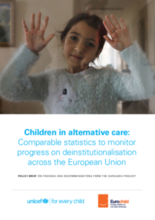There is a firm commitment by the European Union and its Member States to the deinstitutionalisation of children in alternative care and support for their transition to care that is family and community-based. Children growing up in alternative care have very often experienced significant trauma before being placed in care. Residential care, in particular, is known to expose them to additional risks if it is not equipped to provide them with the individualised care they need for their healthy development and social inclusion. Children need stable and safe relationships with caring adults to thrive, and such relationships are far more likely to be created in a family environment.
For that reason, the proportion of children placed in residential care compared to those placed in formal family-based care provides a useful indicator for the monitoring of progress towards a shared goal: to ensure that children in alternative care receive high quality, inclusive, family and community-based care. Such an indicator would shed light on the effectiveness of the deinstitutionalisation reforms that are taking place in many European countries. In combination with other indicators, including the reasons for placement and the later outcomes for children, it would speak directly to the common EU child rights agenda.
To date, however, there has been no comparable and Europe-wide indicator to gauge the share of children growing up within different forms of alternative care. There is, at present, no obligation for EU Member States to collect and report data to the EU on agreed indicators to measure the state of play of deinstitutionalisation and the transition to family and community-based care. The EU Social Scoreboard, for example, does not include any indicator to measure progress in these areas.
The DataCare project, a joint initiative of Eurochild and UNICEF’s Europe and Central Asia Regional Office (ECARO), demonstrates that the surveyed countries in Europe already collect data for children in alternative care. Data being published at national level can be used to establish comparable indicators on residential care and three other relevant and interlinked indicators:
- The rate of children aged 0-17 in alternative care at a specific point in time (per 100,000)
- The rate of children aged 0-17 in residential care at a specific point in time (per 100,000)
- The rate of children aged 0-17 in formal family-based care at a specific point in time (per 100,000)
- The percentage of children aged 0-17 in residential care (of the total number of children aged 0-17 in alternative care at a specific point in time)
The DataCare project, launched in March 2020, has mapped alternative care data systems across the 27 Member States of the European Union (EU-27) and the United Kingdom (UK) to inform a shift towards a more transparent, common approach to data collection and reporting across Europe. Its findings and conclusions are drawn from the analysis of responses from National Correspondents in 23 countries based on the DataCare National Template, together with data and information gathered by the research team for the remaining five countries.
This policy brief summarises the policy context, as well as the key findings and recommendations from the analysis of the national responses to the DataCare survey across Europe. More detailed information can be found in the full research report: Better Data for Better Child Protection Systems in Europe: Mapping how data on children in alternative care are collected, analysed, and published across 28 European countries, which includes a full set of country profiles.
This brief has been produced by UNICEF Europe and Central Asia Regional Office (ECARO) and Eurochild under the guidance of Jana Hainsworth, Secretary General of Eurochild, and Aaron Greenberg, UNICEF Senior Regional Advisor for Europe and Central Asia, Child Protection. The brief was written by Mária Herczog, Florence Koenderink, Ciaran O’Donnell and Anja Teltschik.

